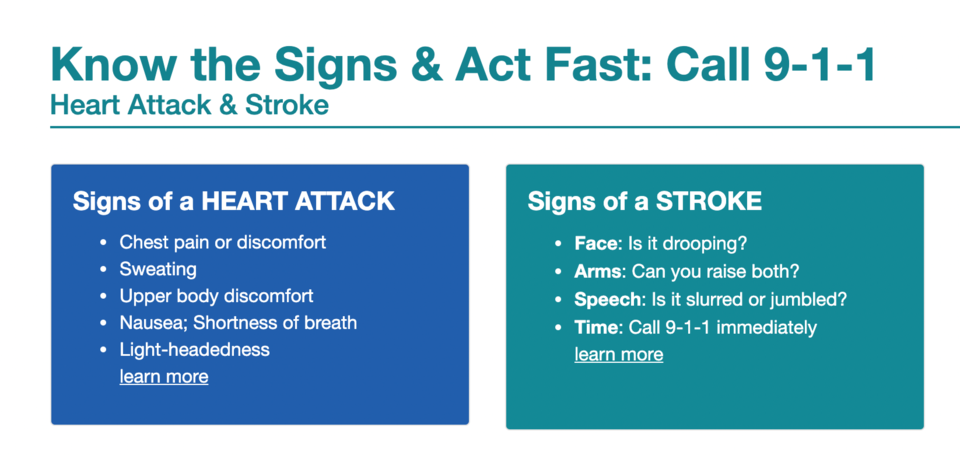LAKELAND - Every second counts when it comes to heart and stroke.
This is why Alberta Health Services (AHS) is telling the public not to hesitate to call 911 when they are showing signs of a heart attack or stroke, through their latest campaign.
The public awareness initiative, which kicked off May 3, will run for two months as a way of reminding Albertans to regularly seek care when it comes to any changes to their health, especially when it comes to serious medical emergencies such as a heart attack or stroke.
“With stroke, it’s a medical emergency. Time is brain. The longer you wait, the more damage is being done to brain cells,” explained Lisa Collins, registered nurse and AHS North Zone cardiovascular lead. “The treatments for stroke are time-sensitive, so the quicker we can get those treatments started, the better."
The first thing someone should do when they notice the signs of a stroke or heart attack is call 911.
“Definitely as soon as you notice the signs of stroke, if you wake-up with those signs or if you develop them suddenly, don’t wait. You want to get help right away,” Collins stressed, adding by calling an ambulance, they can ensure you are taken to the nearest hospital that is best equipped for the care that you need.
"The ambulance knows the best facility to take you to. It may not be the one that's closest to your home, you may have to go a little ways," she stated.
What to look out for
“The signs of a stroke appear suddenly and can include things like weakness on one side or in one limb, the arms, legs, and can also affect the muscles in the face. You’ll often notice a facial droop on one side,” Collins described.
Difficulty speaking, such as jumbled or slurred words, sudden confusion, problems with walking or balance, and a sudden or severe headache are some of the symptoms of a stroke, and are an indication you need to call 911 immediately.
According to Collins, the FAST Campaign has been used to educate the public about stroke.
FAST is an acronym that stands for face, arms, speech, and time.
Collins said anytime you're experiencing chest pain that can "sometimes feel like indigestion," in addition to pain in your arms, chest, or neck you should get checked because it could be the sign of a heart attack.
These symptoms can be accompanied by nausea, vomiting, and sweating.
"If they develop any of those things, they should definitely call 911 or go to the emergency department as quickly as possible,” Collins stressed.
Who's at risk?
While anyone at any age is at risk for a stroke, there are some factors that can put you more in jeopardy.
“Children have had strokes, women who are pregnant can have strokes, most definitely we can see it across the lifespan,” Collins said.
She continued, “I don’t think a lot of people even know some of the risk factors for stroke. Age and family history are things you don’t really have a lot of control over, but there are lifestyle factors that people can modify and make changes to so they lower their risk of having stroke."
Smoking, excessive drinking, high blood pressure, cholesterol, and weight can all play a factor in a person's likelihood of having a stroke.
Those with existing heart conditions and diabetes are also more at risk.
However, there are ways of lowering your chances, Collins said.
Maintaining a healthy weight, watching what you eat, exercising regularly, and taking any medications you're prescribed the way they're prescribed can help cut down your risk of having a stroke.
What can you do while you wait for help
Collins said while there isn't much anyone can do while they wait for help, there are some things they can avoid doing.
Eating and taking medication while suffering from a stroke can be dangerous.
"If it's yourself or your loved one, make sure you're in a safe place, that you're comfortable, don't take any medications, and don't have anything to eat or drink," explained Collins, adding these tips are specifically related to those suffering from a stroke.
"With regards to medication and not having anything to eat or drink, with stroke, if the muscles in the face and neck have been affected, that can impact swallowing. If you try to drink or eat, it can cause choking and that can cause complications."
What it all boils down to is getting help as soon as you can.
“Stroke is the leading cause of disability in adults. The effects of a stroke, it could be the weakness you get in the arm or the leg, and some of those things can be lasting if we don’t get treatments done early. The recovery can take some time. After you’ve had a stroke, intensive rehab can be required to help recover from the effects of a stroke,” detailed Collins.
For more information, visit the AHS attack and stroke webpage at ahs.ca/heartandstroke.



